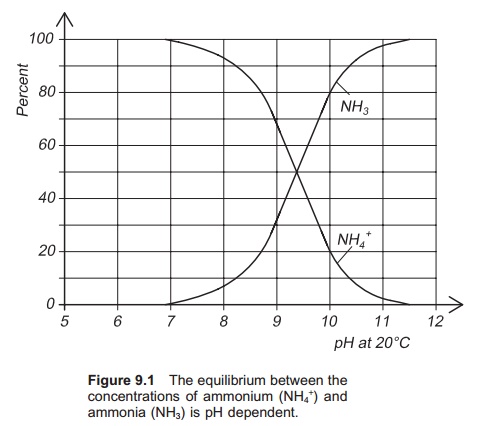Chapter: Aquaculture Engineering : Ammonia Removal
Example of biofilter design
Example of biofilter design
In a fish tank the consumption of
feed is 100 kg/day. The amount of TAN produced by the fish, depends on growth
rate, protein content in the feed and in the fish, amount of nitrogen in the
protein, and the protein uptake and digestion. A secretion of TAN to be between
30 and 40 g per kg feed can be used for further calculation. The water
temperature is 20°C and the pH is 7. The design and size of the biofilter can
be calculated as follows.
The secretion of TAN will be 3–4
kg per day. At pH 7 and a water temperature of 20°C only 0.4% is NH3
(see Fig. 9.1). The TAN concentration is therefore almost equal to the the
concentration of NH4+.

Under normal conditions the
nitrification rate mainly depends on water temperature. From Table 9.1 it can
be ascertained that at 20°C a value of 1.0 g NH4+ per m2 biofilter
surface area per day can be used. The biofilter medium must therefore have a
surface area (Ba) of:
Ba=(3000 to 4000)/1
= 3000 m2 to
4000 m2
It is normal to have a security
factor when designing the biofilter: a value of 2 is quite commonly used. The
necessary area is therefore 8000 m2.
The next steep is to choose a
filter medium to fit the necessary volume. If choosing a filter with a surface
area of 300 m2 per m3 filter medium, the total volume
required will be 8000/300 m3, which is close to 27 m3.
Actual designs use submerged up-flowing filters or trickling filters. A
combination is also quite commonly used. The recommended ratio if both are used
is from 2 : 1 to 1 : 1. This means that the filter can have an 18 m3
submerged filter and a 9 m3 trickling filter.
Related Topics